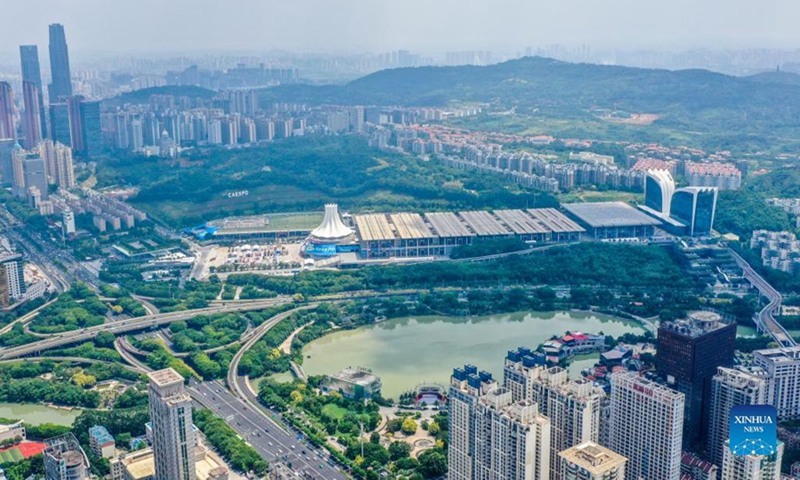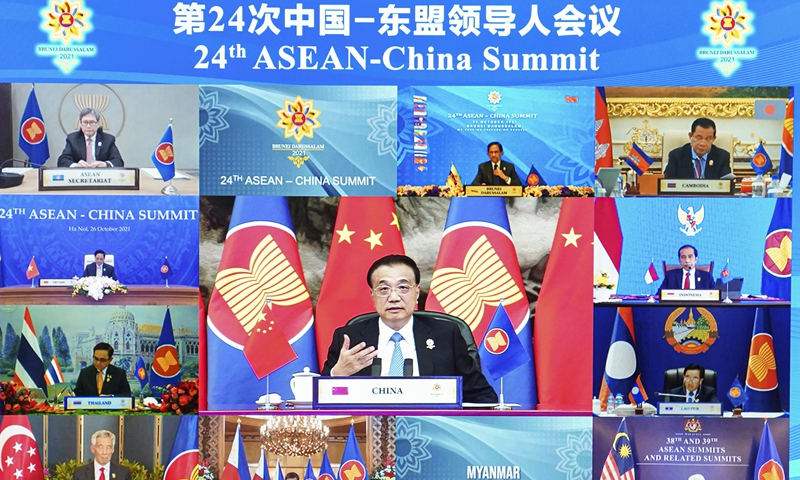
Aerial photo taken on Sept. 10, 2021 shows a view of the Nanning International Convention and Exhibition Center, the venue of the 18th China-ASEAN Expo and China-ASEAN Business and Investment Summit, and its neighboring buildings in Nanning, capital of south China's Guangxi Zhuang Autonomous Region. File photo:Xinhua
Officials from global economies including China, the US, Japan and ASEAN countries have gathered online to attend the 38th and 39th ASEAN Summit, which is being held over a three-day period from Tuesday.
Despite the US government's attempts to rope in the ASEAN region against China, China still has many chances to work closely with ASEAN economies, to boost their robust trade ties and local industries such as electric cars, as the ASEAN countries are moving towards self-reliance, experts said.
The summit will discuss how to strengthen ASEAN's regional role and advance the region's economic recovery from the coronavirus pandemic. Myanmar didn't send representatives to the meeting.
During a video conference on Tuesday, ministers of the ASEAN countries were urged to advance ASEAN's relations with external parties based on the principles of strengthening ASEAN inclusivity and centrality, as stressed in the ASEAN Outlook on the Indo-Pacific (AOIP) strategy.
The AOIP, which was launched by ASEAN members at the 34th ASEAN Summit in June 2019, is based on the principles of ASEAN centrality, inclusivity and respect for international law, the AOIP document showed.
A number of separate summits and meetings will also be held among ASEAN leaders and representatives from the region's leading trade partners including China, the US and South Korea during this year's summit.
Chinese Premier Li Keqiang said via a video link at the 24th China-ASEAN leaders' meeting that China would deepen friendly and mutually beneficial cooperation with ASEAN economies, while calling for the early entry into force of the Regional Comprehensive Economic Partnership (RCEP).

Chinese Premier Li Keqiang (center) takes part in the 2021 Association of Southeast Asian Nations summit online at a live video conference in Bandar Seri Begawan, Brunei, on October 26, 2021. Photo: Xinhua
Indian Prime Minister Narendra Modi will attend the 18th ASEAN-India Summit, to be held on Thursday, to review the status of the ASEAN-India Strategic Partnership, the Indian Express said in a report on Tuesday.
US President Joe Biden will also attend an ASEAN-US summit, the first time in about four years, which overseas media outlets said reflected the US' intention to engage more with ASEAN economies as key to its strategy of pushing back China.
According to a statement published by the White House on Tuesday, Biden said that he applauded the AOIP, reaffirming the US commitment to strengthening its partnership with ASEAN.
Gu Xiaosong, dean of the ASEAN Research Institute of Hainan Tropical Ocean University, said that Biden's participation shows the US is attempting to pull ASEAN members into its "trenches" against China.
However, he stressed that ASEAN economies' focus on the AOIP initiative reflects that they are inclined to remain independent from external political influences and are open to strengthen cooperation with both the US and China.
"ASEAN members need support and help from China in terms of the economy... in particular, China-ASEAN trade has grown steadily, even with the coronavirus crisis...I don't see any negative factors to developing trade cooperation between ASEAN and China," Gu told the Global Times on Wednesday.
Experts also stressed that the under the framework of the AOIP, there are many chances to strengthen not only China-ASEAN cooperation, but also economic partnerships between China and other Asian economies like Japan.
"For example, China can strengthen cooperation with Thailand, which had the largest electric vehicle sales among ASEAN economies, to build Thailand into ASEAN's EV center," independent economist Song Qinghui told the Global Times.
Song also stressed that China can work with Indian, Japanese and South Korean companies to explore third-party markets in ASEAN.
Hu Qimu, chief research fellow at the Sinosteel Economic Research Institute, said that in terms of industry chains, there is both competition and cooperation among China, Japan and South Korea. For example, Japan and South Korea are on the upstream of China's industry chain in many sectors such as chips and components, so China has ample room to cooperate with them.
"China is a huge market, but at the same time, China's industrial upgrading will also pose a threat to the industries of Japan and South Korea. The competitive and cooperative relationship among the three countries will be dynamic," Hu said.
He nevertheless stressed that the Asia-Pacific region enjoys considerable economic growth and a large market. "If countries join a multilateral mechanism, the benefits will sure outweigh the harms," he said.





